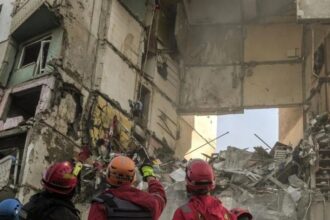Robert Goldman, American University
GAZA: More than a month after Hamas fighters killed 1,400 Israelis in a shock assault, bombs continue to fall on the Gaza Strip in reprisal Israeli attacks.
The aerial campaign has left a heavy death toll – the health authority in the Hamas-run enclave has put the total number of Palestinians killed in excess of 10,000 – leading to questions over whether the response by Israel has been proportionate.
“Proportionality” has a place in what is described as the “laws of war.” The Conversation turned to Robert Goldman, an expert on international humanitarian law at American University Washington College of Law, for guidance on some of the issues.
What are the ‘laws of war’?
The laws of war, also known as international humanitarian law (IHL), consist of the four 1949 Geneva Conventions, their two Additional Protocols of 1977, the Hague Conventions of 1899 and 1907, as well as certain weapons conventions. It also includes what is known as “customary law” – rules that are accepted by states are legally binding, but are not necessarily part of any formal treaty.
Simply put, these instruments seek to spare civilians and others who are no longer active combatants from the effects of hostilities by placing restrictions and prohibitions on the conduct of warfare.
It is important to understand that modern IHL is not concerned with the reasons for, or the legality of, going to war. Rather, that is governed by the United Nations Charter and member states’ own practice.
It is also important to note that violations of the laws of war are notoriously hard to prosecute and can be frustrated by lack of cooperation by the parties involved.
ALSO READ: Israel-Palestinian war, there’s a big difference between a humanitarian pause and a ceasefire
Can civilian structures ever be lawfully attacked?
Under IHL, civilian objects – such as homes, apartment blocks, hospitals and schools – cannot be directly attacked. This is because they, unlike munitions factories and command and control centers, do not effectively contribute to military action.
There is a caveat, however. If enemy forces take up positions in these civilian structures, then they become military objectives and can be lawfully bombed if the raid would yield the attacking party a definite military advantage.
That said, the stipulation does not allow unlimited license to attack such structures. The civilians located in those buildings are not lawful targets. As such, they retain the benefits of what is known as “the rule of proportionality” as it relates to collateral civilian casualties – that is, deaths that are not intended by the attacking party but nonetheless result from their actions.
ALSO READ: Israel-Hamas war puts China’s strategy of ‘balanced diplomacy’ in the Middle East at risk
What exactly is the rule of proportionality?
The rule of proportionality applies to all armed conflicts as part of customary IHL.
The proportionality rule operates as a general restraint on the conduct of parties engaged in hostilities and applies to attacks against lawful military targets located in the vicinity of civilians and civilian structures. It prohibits an attack that may be expected to cause incidental death or injury to civilians or the destruction of civilian objects that would be excessive – or disproportionate – in relation to the concrete and direct military advantage anticipated.
As such, the rule does not apply to enemy combatants or civilians who are directly participating in hostilities.
The proportionality rule requires those who plan a military operation to undertake in good faith a pre-attack analysis to determine the effects of the attack on civilians and civilian objects.
Such a determination requires a balancing of probabilities that take in foreseeable collateral civilian casualties and the relative importance of a particular military target. This is a relational concept – in other words, it can’t be quantified by stating any fixed number of civilians dead or injured for any one attack.
Given the uncertainties of warfare, the actual number of civilian casualties may be greater or less than what the pre-attack analysis predicted. So too might the military advantage gained.
As such, the lawfulness of such an attack must be based on an honest appreciation of the facts and circumstances known to military planners at the time, and not in hindsight.
In addition, planners of a particular attack must choose a weapon that ideally will avoid or minimize likely civilian collateral damage.
Importantly, planners of any attack must suspend or cancel the operation if it becomes apparent that the target selected is not a military objective, or if the attack will result in disproportionate collateral damage.
As such, the rule or proportionality requires the attacking party to place high priority on the timely collection and evaluation of target intelligence.
ALSO READ: More than one journalist per day is dying in the Israel-Gaza conflict. This has to stop
Is the rule of proportionality being observed in Gaza?
In concrete terms, the rule of proportionality – and its associated precautionary measures – require that the Israeli military undertake, in good faith, a pre-attack analysis of likely civilian casualties ensuing from each and every aerial attack in Gaza. That analysis should be based on timely, reliable and constantly updated target intelligence.
Israeli military spokesmen have stated repeatedly that they are taking all feasible measures to avoid excessive collateral damage in their bombing campaign.
But given the alarming civilian death toll in Gaza, I would submit that the burden has now shifted to the Israeli military to be more forthcoming in explaining to the public its target selection criteria. This is especially needed in those attacks that have caused extensive civilian deaths.
For the same reason, I believe the onus is now on the Israeli military to explain what precautionary measures it has taken to avoid or minimize collateral damage, particularly given recent reports that it has used so-called “dumb bombs” instead of precision-guided munitions in its campaign.
Part of this article appeared in an earlier article published by The Conversation on Oct. 15, 2023.
Robert Goldman, Professor of Law, American University
*This article is republished from The Conversation under a Creative Commons license. Read the original article.













